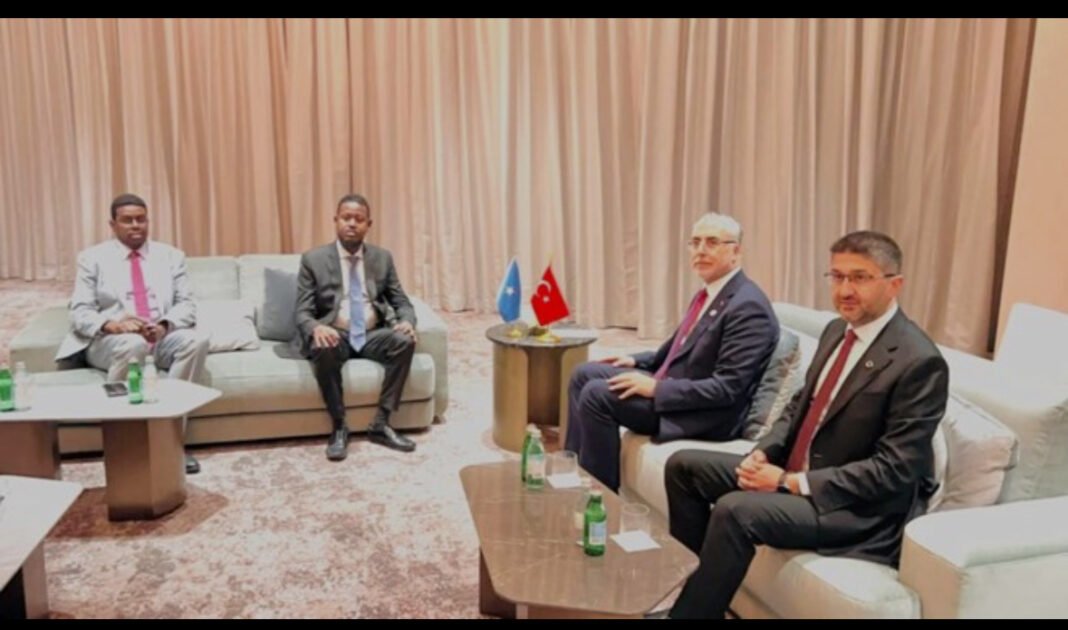DOHA, (HAN) — Somalia and Turkey are taking concrete steps to finalize a comprehensive bilateral labor cooperation agreement aimed at promoting job creation, workforce development, and skills transfer in the Horn of Africa nation.
The initiative advanced on Saturday when Somalia’s Minister of Labour and Social Affairs, Yusuf Mohamed, met with Turkey’s Minister of Labour and Social Security, Prof. Dr. Vedat Işıkhan, on the sidelines of an official event in Doha, Qatar. The two ministers discussed the details of the agreement, which was approved by the Somali Council of Ministers in July 2025 and is expected to be formally signed soon in Ankara.
According to Somali officials, the pact represents a major step in deepening long-standing relations between Mogadishu and Ankara, focusing on employment generation, skills training, and institutional capacity building within Somalia’s labor sector. The agreement will provide technical expertise, vocational education, and administrative support to strengthen Somalia’s Ministry of Labour and Social Affairs and improve its ability to regulate labor markets.
“The government of Somalia is committed to advancing decent work opportunities for all citizens,” Minister Mohamed said after the meeting. “This agreement with Turkey will open new horizons for our young people and enhance the professional capacity of our labor institutions.”
Prof. Dr. Vedat Işıkhan reaffirmed Turkey’s readiness to support Somalia in modernizing its labor systems, emphasizing the importance of human capital development for long-term stability and growth.
“Turkey stands with Somalia as a partner in progress,” Işıkhan said. “We are determined to share our experience in social welfare administration, employment services, and vocational education to help Somalia build a strong, inclusive labor market.”
Under the new cooperation framework, both sides agreed to launch specialized training programs for Somali labor officials, inspectors, and employment service officers. These programs will be conducted in collaboration with Turkish labor institutions and vocational centers, focusing on areas such as workforce planning, occupational safety, social protection, and youth employment initiatives.
The deal also includes provisions for exchange visits, policy research collaboration, and technical assistance to help Somalia implement modern labor standards and improve social dialogue between employers, employees, and the government.
The bilateral cooperation is expected to play a key role in addressing Somalia’s high unemployment rate, particularly among youth and women, by linking skills development with the country’s emerging sectors such as construction, fisheries, and renewable energy.
Minister Mohamed praised Turkey’s broader contribution to Somalia’s recovery over the past decade, noting that Ankara has remained one of Mogadishu’s most reliable partners in infrastructure, education, health care, and humanitarian assistance.
“Turkey’s support has always been more than symbolic — it’s been practical, timely, and impactful,” Mohamed said. “Our cooperation goes beyond government ties; it is built on trust, shared values, and a common vision for progress.”
Since the reopening of the Turkish Embassy in Mogadishu in 2011, Turkey has invested heavily in rebuilding Somalia’s key institutions, including hospitals, schools, roads, and administrative facilities. Turkish agencies and companies have also played a vital role in providing scholarships to Somali students, constructing airports, and facilitating humanitarian relief operations.
Analysts say the new labor cooperation agreement aligns with Somalia’s National Employment Policy, which aims to reduce unemployment and promote decent work through international partnerships. The deal also strengthens Turkey’s growing diplomatic and economic footprint in East Africa.
The official signing ceremony of the Somalia–Turkey labor cooperation agreement is expected to take place in the coming weeks in Ankara, where delegations from both countries will finalize the framework for implementation.
As Somalia continues to rebuild after decades of conflict, partnerships like this one are seen as critical to creating sustainable livelihoods, empowering youth, and supporting long-term peace and stability.




